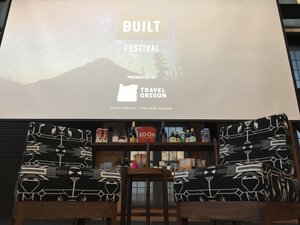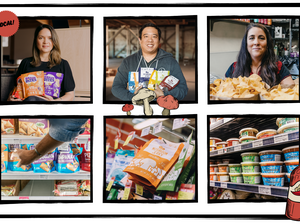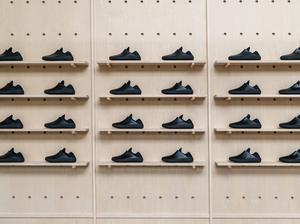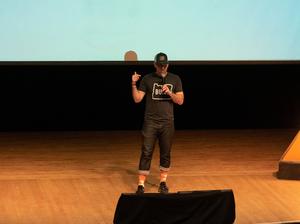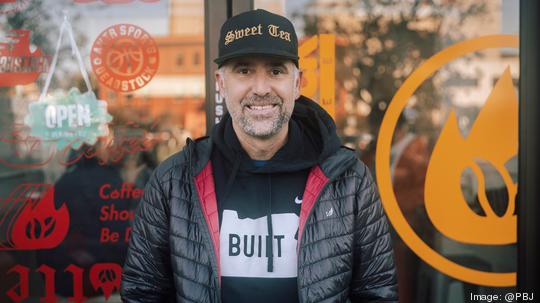
When Mitch Daugherty looks at Oregon's business landscape, he sees a place ripe with talent and companies in consumer products. There's Tillamook County Creamery, Tofurkey, Hydro Flask, Dutch Bros, Columbia Sportswear and Nike to name some of the most well-known brands
There are even more small and mid-sized and regional brands growing here. It's this corner of the economy — consumer products — that Daugherty thinks too often gets dismissed when leaders discuss economic development in Oregon.
It’s part of the reason why he helped start the nonprofit Built Oregon, which offers events, programming and support to consumer product founders. One program is Bridges, which helps BIPOC- founders get their products on retail shelves. In three years 85 startups have participated in Bridges and the program is now supported in part by Prosper Portland.
We caught up with Daugherty, who has been in Portland since 2002, to talk about his work with consumer product founders.
When did you start to see the need for an organization like Built? The gap I saw came from a mentor of mine, when I was board chair of Oregon Entrepreneurs Network, Shelley Gunton. If you remember 2014/15 and that startup mythology of just raise money and tech (was a focus) and somehow the state wanted to be like Seattle and the Bay Area. She was like ‘we just make stuff in this state. That is who we are. That is our legacy.' We build massive companies but the problem is they’re just incredible companies that are aggressively humble. They don’t stand on mountaintops and raise money.
So that started me down the path: is there something in this whole idea of consumer products being what the state should own from a competitive standpoint, from an economic development standpoint.
Is that why Built launched as an online magazine? We launched Built as a Kickstartered (magazine) just to tell stories. Part of that was it allowed me to talk to a bunch of companies around the space. That was my research. Is this a thing? Ultimately, what I realized, and we flipped it to a nonprofit and launched the Festival, was we are the Silicon Valley of consumer products. But somehow the state doesn’t want to say that.
Why do you think that is? It’s multiple reasons. Tech, biotech, venture capital it still weighs heavy. It’s high paying jobs. An investment round of $10 million sounds great. And that's all good, don’t get me wrong. But consumer products just take a long time to build. It’s that lack of patience around wanting to build the next Keen Footwear, Tofurky, Hydroflask or whatever. And part of it is (the state) silos consumer products. There’s (a vertical) for food and beverage, there is a vertical for outdoor footwear, and another vertical for health and beauty when in reality people bounce around all those quite a bit. And the challenges and opportunities and stuff are very similar.
You were chair of OEN twice and have been very involved with that group in the past. Why start something new? (OEN) is everything. Which is great, it’s all entrepreneurs. What I wanted to do is say, I’m just doing consumer products. We are not gonna mess with tech, biotech, clean tech or any other industries. That was the differentiator.
What is your vision for how Built organizes and grows? The long term vision from me is really to get industry more connected to what we’re doing. Economic development in general tends to be a lot of times distanced from what’s actually happening on the ground from an entrepreneurial standpoint. If we can get corporations and private companies more involved in what we are doing. If someone is working at Tillamook and through our program we give them an opportunity to mentor and by doing that they can make a human connection with (a founder). Long term economic and community development has to happen on a human level now more than ever.
The economy has shifted and there are layoffs and people potentially that are in a position to take a side project or a hobby and make it a job. What is your advice for those would-be founders? (My advice) is always to talk to someone who’s done it before. And when I say who’s done it before, somebody who is a $3 million to $10 million company, not a $100 million company. Someone who is actually still pretty close to the hard times to really get in the weeds on how much it is going to cost to go from nothing , to the ability to pay yourself, to scaling. Hypothetically, food and beverage is hard. It’s expensive. In Oregon you can get into New Seasons, Market of Choice and be in 30 to 40 doors. But then you go to a distributor and that margin goes down a lot.
Mitch Daugherty
Director, Built Oregon; Entrepreneur-in-Residence, Lewis & Clark College
Previous: Co-founder, Arizona Outback Adventure (eventually acquired by REI in 2019); Parter/founder Morange Design
Hometown: Pheonix, Arizona
Education: Bachelor’s in biology, Arizona State University.
Currently Reading: “Designing the New American University,” by Michael Crow and William Dabars
Most played artist on your playlist: Any '80s and early '90s R&B
Go-to restaurant or foodcart: The Portland Mercado
Favorite Oregon hike: Trilium Lake
Oregon brands whose products you currently can’t live without: Steelport Knives; Ruby Vineyard; Jordan Brand; Trew and Deadstock collab jacket.
